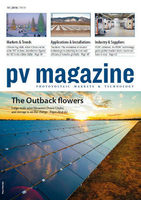Despite both overt and covert hostility to renewable energy at the federal level, a recent study found 37% of consumers say “increasing the use of solar power” is their No. 1 priority.
According to Deloitte’s annual “Resources 2017 Study – Energy Management: Sustainability & Progress,” grid parity, driven by technological advances and plunging prices, has allowed consumers and businesses to choose clean energy over more traditional fossil-fuel options.
“The demand for clean energy has passed the point of no return,” said Marlene Motyka, U.S. and global renewable energy leader and principal, Deloitte Transactions and Business Analytics LLP. “It is not only political anymore. It is an economic issue. Green energy no longer solely means environmental concerns – ‘green energy’ also means the dollars that can be saved by investing in wind, solar and other clean energy sources.”
The report finds 63% of consumers are concerned about Climate Change, despite last week’s decision by President Donald J. Trump to pull out of the landmark Paris Climate Accords under the gloss of “putting America first.” In addition, 37% of consumers say “increasing the use of solar power” is their top issue.
Almost 60% of consumers said they would switch electricity providers if they could gain access to renewable-energy sources, adding they would be willing to pay a 4% to 8% premium on their electric bills. The report does note, however, that the need for those surcharges has also declined.
And the report says the solar revolution is being driven in large part by the much-maligned “millenials.” Almost two-thirds (64%) told Deloitte they are either “extremely” or “very” interested in installing solar panels – a 611% increase over last year. More than half of them are “extremely” or “very” interested in participating in a community solar installation.
Popular content
“Utilities are not only contending with demands to secure power from cleaner sources, but also the growing, significant gap in values, preferences and motivations between millennials and older age groups,” said Scott Smith, vice chairman and U.S. power and utilities leader, Deloitte LLP. “This gap seems especially substantial when it comes to use of technology and social media,” “As customer expectations change and many become more active energy consumers, utilities likely need to be more flexible in tailoring service offerings to meet new demands.”
But the good news doesn’t just stop at consumers: Businesses want to get in on the action, too. According to Deloitte, 60% of businesses want to have some form of on-site generation, nearly double the percentage from last year. In addition, 33% say they want to increase self-generation, and 26% say they intend to develop self-generation capabilities. Another 35% say they have considered implementing or participating in a microgrid.
“This is an exciting time as businesses of all sizes seem to be building momentum in energy management based on their consistent successes year over year,” concluded Motyka. “As companies seek to up their game to reduce energy consumption and increase use of renewable energy, it should be good news for individual businesses, their shareholders and employees, as well as their communities at large.”
Update: This article was updated at 12:42 pm EST on 6/14/17 to reflect that though support for solar has increased, it has only increased 4% TO 37%, not FROM 4% to 37%. The author regrets the error.
This content is protected by copyright and may not be reused. If you want to cooperate with us and would like to reuse some of our content, please contact: editors@pv-magazine.com.



4 comments
By submitting this form you agree to pv magazine using your data for the purposes of publishing your comment.
Your personal data will only be disclosed or otherwise transmitted to third parties for the purposes of spam filtering or if this is necessary for technical maintenance of the website. Any other transfer to third parties will not take place unless this is justified on the basis of applicable data protection regulations or if pv magazine is legally obliged to do so.
You may revoke this consent at any time with effect for the future, in which case your personal data will be deleted immediately. Otherwise, your data will be deleted if pv magazine has processed your request or the purpose of data storage is fulfilled.
Further information on data privacy can be found in our Data Protection Policy.